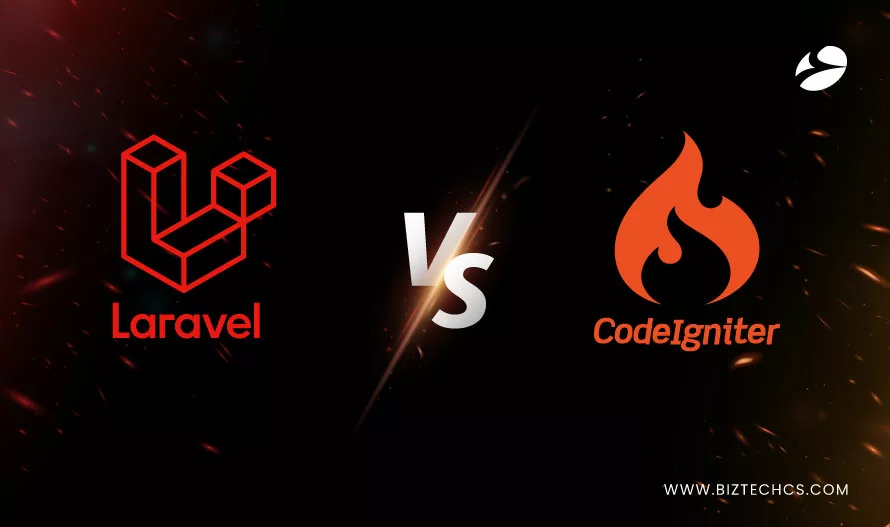2631
Laravel vs. CodeIgniter: Choosing the Right PHP Framework in 2024
05 Mar, 2024
7 min read
2631
05 Mar, 2024
7 min read
Table of content

PHP is one of the most renowned programming languages we have had till date. About 76.5% of all websites on the internet are powered by PHP, as per W3techs. Used by industry leaders like Facebook, WordPress, Microsoft, Vimeo, and Wikipedia, PHP is a robust and scalable programming language that we know of.
What makes this programming language even more robust and sophisticated than ever are its various frameworks. These frameworks make development easier as developers don’t have to code everything from scratch; rather, they can add more in-built functionalities.
Today, we are going to pick two of its popular frameworks and compare them in detail. So, if you are curious which framework wins in the battle of Laravel vs. CodeIgniter in 2024, stay put.
Laravel is an open-source PHP web framework created by Taylor Otwell in June 2011. It is based on Symfony (Note that Symfony is another PHP framework. For detailed information, check out Laravel vs Symfony) and follows the MVC (Model, View, Controller) architecture pattern, helping you separate data and business logic.
Primarily used for server-side programming, it is used for developing web applications where scalability is an important aspect. Its easy and sophisticated syntax, support for rapid development, and huge community support makes it popular as a PHP framework.
Community Support and Resources: Laravel has a large and active community of developers and contributors. This means a wealth of resources, tutorials, and forums are available to help solve development challenges. Additionally, Laravel’s extensive documentation is incredibly helpful.
Reliance on Third-Party Packages: While Laravel’s extensive ecosystem of packages and tools is generally a strength, reliance on third-party packages for extended functionalities can lead to issues if those packages are poorly maintained, become deprecated, or have security vulnerabilities.
CodeIgniter is an open-source PHP web framework used for developing dynamic web applications. Like Laravel, it also uses MVC architecture pattern for development of websites and supports rapid development.
Developed by CodeIgniter Foundation, it was first released in February 2006. It is known for its small footprint, exceptional performance, and simplicity. CodeIgniter is both powerful and lightweight, allowing you to develop websites with minimal configuration.
Slow Development Pace: The development and release cycle of CodeIgniter has traditionally been slower than some of its competitors. This can lead to the framework feeling outdated more quickly and may delay the incorporation of new features and improvements.
Slow Development Pace: The development and release cycle of CodeIgniter has traditionally been slower than some of its competitors. This can lead to the framework feeling outdated more quickly and may delay the incorporation of new features and improvements.
Now that you are familiar with the two PHP frameworks, let’s compare CodeIgniter vs Laravel and help you decide the one suitable for your project.
As per Built With trends, there are about 743,089 active Laravel websites in the internet and about 430,548 CodeIgniter websites.
If you check in GitHub, a developer platform that allow developers to code, manage, and share codes, you will see that Laravel boats a much higher number of stars (31.1k) compared to CodeIgniter (18.3k).
Winner: Laravel
Note: Popularity doesn’t show one is better than another, and you must consider all the other aspects that can impact development for you before deciding.
CodeIgniter follows a minimalist design and is lightweight and straightforward. This simplicity translates into faster web development and doesn’t create situations of performance overhead. Thus, you get improved load times for your web application. In fact, the simplistic approach can also lead to faster database query executions.
As for Laravel, it is heavy weight compared to CodeIgniter and its sophisticated functionalities may add performance overhead. But with right optimization and caching techniques, these issues can be resolved. Moreover, recent Laravel updates are built by keeping modern web development technologies in mind with features like middleware, events, and package management.
Laravel’s Eloquent ORM further helps with active record implementation for working with databases. Though developer-friendly, it may lead to slower database operations compared to raw queries or lighter ORMs when not used carefully.
Thus, comparing Laravel vs CodeIgniter performance gives you a close observation of how the two framework perform in terms of stability and speed.
Winner: It’s a tie!
When speaking of web development, security is one of the key aspects of comparison. Regardless of the industry you are in, security is pivotal for your website. Let’s check how both the frameworks perform un this regard!
Laravel comes with a ton of features that improve security for your website. It automatically generates and verifies CSRF tokens for each active user session, protecting against cross-site request forgery attacks. It also prevents otheer security issues like XSS, Password hashing, and uses Eloquent ORM to prevent SQL injection attacks.
Its encryption, authentication, and autorization facilities further secures the web applications built on Laravel.
Unlike Laravel, CodeIgniter doesn’t come with built-in authorization and authentication features. So, you have to integrate trusted third-party authentication tools or build one of your own. Though CodeIgniter does come with security features that prevent SQL injection attacks, XSS filtering, and CSRF protection, it depends on your manual implementation.
Winner: Laravel
As mentioned already, CodeIgniter follows a minimalistic design approach. So, if you are building any simple and smaller projects where speed is critical, CodeIgniter woks efficiently. However, it is not inherently scalable and require developer skills to build scalable web applications.
In the PHP Codeigniter vs Laravel comparison, Laravel gets ahead in terms of scalability. Laravel’s queue service abstracts various queue backends and provides a unified API, helping manage long-running tasks and thereby improving application scalability and user experience.
The built-in cache support for popular cache backends further simplify management of state across multiple servers. Its built-in database migration also facilitate easy updates as the web application scales.
Winner: Laravel
Laravel’s modular packaging system with dependency management makes it easy to add pre-packaged modules and develop modular apps. The service container in Laravel also help with managing class dependencies and perform dependency injection.
However, CodeIgniter doesn’t support in-built modularity natively. Developers have the option to build modules based on MVC pattern using third-party packages or hooks. However, it can be tedious and time-consuming.
Winner: Laravel
Laravel provides a plethora of functionalities that facilitate error handling. Its in-built exceptional handler lets developers manage exception log and display. Monolog in Laravel facilitates error logging in various formats. You can also craete custom error pages to improve user experience.
Error detail levels can be easily configured in Laravel based on the environment, ensuring detailed error reporting during development while avoiding exposure of sensitive information in production.
Error logging in CodeIgniter is pretty simple too. From custom error handling to configuration of error reporting levels, CodeIgniter helps with error detection and resolution.
However, PHP framework Laravel vs Codeigniter comparison shows that Laravel is more sophisticated in terms of error handling.
Winner: Laravel
The level of support and the size of the community surrounding a framework can significantly impact your development experience.
Laravel boasts one of the largest and most active communities among PHP frameworks. This vibrant community contributes to a vast ecosystem of tutorials, forums, blogs, and third-party packages.
CodeIgniter has a loyal and long-standing community, though smaller and less active compared to Laravel’s. The community is supportive and contributes to forums, GitHub, and other online resources. While CodeIgniter’s community might not match Laravel’s in size, it still offers valuable support to developers.
Winner: Laravel
In the comparison between Laravel and CodeIgniter, it’s clear that both frameworks have their strengths and cater to different needs and preferences within the PHP community. Laravel, with its elegant syntax, comprehensive feature set, and robust ecosystem, stands out for developers seeking a modern, full-stack framework that emphasizes convention over configuration.
On the other hand, CodeIgniter, known for its simplicity, performance, and lightweight nature, appeals to developers looking for a straightforward, flexible framework that allows for more control and less overhead. Its ease of use, clear documentation, and straightforward approach make it ideal for small to medium-sized projects, or for those who prioritize speed and simplicity over an extensive array of built-in features.
The final verdict between Laravel and CodeIgniter depends on the specific requirements of your project, your team’s expertise, and your development goals. Laravel is the go-to choice for those embracing newer PHP features and who need a scalable, feature-rich framework, while CodeIgniter is well-suited for projects where a leaner, more performance-optimized approach is preferred.
Are you still comparing PHP Laravel vs Codeigniter and want an expert’s perspective to gauge your specific needs? Then, our developers can assist you. With more than a decade of PHP expertise, we can help you with web app development, design, deployment, support and maintenance.
Leverage our industry experience and skills on other Javascript frameworks to build a complete web solution for your business. So what are you waiting for? Connect with our developers today!

Odoo
337
By Devik Gondaliya
25 Jun, 2025

Odoo
964
By Devik Gondaliya
12 Jun, 2025

Odoo
924
By Devik Gondaliya
11 Jun, 2025